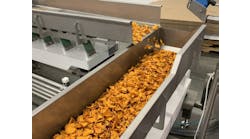Jasper Hill Farm is a 45-cow farm and creamery in Greensboro, Vt., and one of most recognized artisan cheese companies in North America. The facility produces its own award-winning cheeses, partners with nearby Cabot Creamery to produce and market a traditional Cheddar that is sold coast-to-coast, and through a separate business entity, it helps smaller Vermont artisans reach a wider customer base.
Dig a little Deeper
A Full Scale Water Recovery and Reuse Project at Frito-Lay
In 2012, the Clean Water America Alliance awarded a US Water Prize to PepsiCo Frito-Lay for its Casa Grande, Arizona, facility, earning it the designation as the first full-scale “water and recovery reuse plant” in the US. The 650,000-gallon-per-day process water recovery treatment system recycles up to 75% of the facility’s process water, enabling Frito-Lay to reduce its annual water use by up to 100 million gallons. Listen or watch this webinar, which discussed the design, construction and operational lessons learned during and after the start-up of this project.
Recently, Jasper Hill constructed an innovative, integrated biological treatment system it calls the Green Machine, which enables the company to manage dairy wastes (the manure, whey and wash-water that result from milking cows and producing cheese) in an environmentally responsible manner.
The installation integrates proven waste treatment, nutrient management and energy recovery strategies into a single, closed-loop, scaled system. The system uses composting for the manure solids; anaerobic digestion for the first-phase liquids treatment; and an advanced botanical system (ABS) for second-phase liquids. For nutrient management, the compost is pasture applied, and treated water from the ABS irrigates pastures to extend the grazing season. The Green Machine recovers energy from composting to heat the liquid waste treatment system, and methane gas from the anaerobic digestion tanks to fuel the creamery's boiler.
"As a pasture-based dairy farm, the health of our land and cows are integral to the health of the business," said James Coe, architect and project manager for Jasper Hill Farms.
"With this technology, we can return nutrients to the soil without negatively impacting water quality or passing pathogens into the cows. The Green Machine gives us greater control over the elements that assure quality soil, grass, and cows, so that we can continue to produce the best milk possible for our award-winning cheeses."
Jasper Hill worked with EcoSolutions LLC Westford Vt., on the project.
According to Coe, "This is a solution that can be replicated and scaled up," for larger farms and for smaller food manufacturers. "We now have a laboratory that allows us to better understand the nutrient and energy pathways on our farm and refine our process. The data that we gather will also be helpful in pursuing future grant funding."
EcoSolutions is among a handful of companies providing wastewater systems that can be applied to food manufacturing. These companies have brought their solutions to market in the recent decades as other food processors have been continually challenged to find alternatives to direct release into waterways and publically owned treatment works (POTW) systems, and other legacy options like raw land application, says Gerard Van Gils executive vice president of Kemco Systems, Clearwater, Fla.
"In the past several decades, most food plants have installed some form of treatment such as physical-chemical or biological (aerobic and/or anaerobic process) in order to comply with their local POTW limits," Van Gils says. "Most plants also have some form of screening to remove large solids and pH control to ensure a safe range of pH discharge to the POTW."
Kemco provides options like ceramic microfiltration (CMF) and air-sparged hydrocylone systems. The company recently installed a CMF at a large Arkansas food plant operated by a major processor. The system was able to reduce biological oxygen demand (BOD) by up to 97 percent and its total suspended solids by up to 99 percent. The client was happy enough with the Kemco CMF system that the company ordered a second stage system, and encouraged its parent company to order a CMF system as well.
In other applications Kemco has worked with customers to develop systems that convert wastewater into gray water or even better. In some instances that water can be used in CIP systems for fleet washing. In the latest example of these, the CMF system is combined with reverse osmosis.
When a food processor shoulders a larger share of the waste treatment burden, odors can become an issue, says Beau Kinsey, field sales engineer out of OMI Industries, Long Grove, Ill. The company offers Ecosorb, a line of natural, odor absorbing products with a variety of applications.
"In eliminating the odors related to food processing, our products can be used in all areas of a processing plant, from front offices, to dumpsters reserved for waste materials," Kinsey says. "Additionally, our capability to scientifically analyze a site's specific odor molecules and engineer a solution based on the particular needs of the situation offers a groundbreaking advantage in servicing new and existing customers."
This article originally appeared in the March 2013 issue of Food Processing Magazine.


